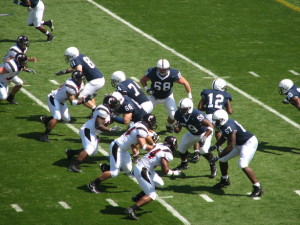October 1, 2015
 Yesterday morning, the Ninth Circuit Court of Appeals affirmed in part, and overturned in part, last year’s highly publicized decision regarding Ed O’Bannon’s antitrust case against the National Collegiate Athletic Association (“NCAA”), on which we previously blogged.
Yesterday morning, the Ninth Circuit Court of Appeals affirmed in part, and overturned in part, last year’s highly publicized decision regarding Ed O’Bannon’s antitrust case against the National Collegiate Athletic Association (“NCAA”), on which we previously blogged.
Specifically what portions of the District Court ruling did the Appeals Court affirm and overturn?
The Appeals Court agreed with the Northern District of California District Court Judge’s ruling that the NCAA’s limitation on student-athlete compensation violated the Sherman Antitrust Act by being too restrictive. As such, the Appeals Court affirmed that portion of the ruling which instructed the NCAA to permit schools to provide up to the full cost of attendance to its student-athletes in the form of scholarship. The NCAA’s rules had historically created a shortfall of a few thousand dollars per student-athlete by not allowing the schools to provide for expenses, such as transportation and non-required books and supplies.
However, the Appeals Court overturned the District Court’s injunctive ruling which had directed the NCAA to allow schools to pay athletes up to $5,000 per year in compensation for use of their names, images and likenesses (“NIL”). The District Court had previously ruled that such NIL–related compensation should come in the form of deferred cash payments upon graduation. The Appeals Court disagreed, finding that student-athletes cannot receive payments that are completely untethered to educational expenses. The Appeals Court saw a stark difference between offering student-athletes education-related expenses as compared to cash payments that are unrelated to school attendance expenses.
Impact of Appeals Court’s Antitrust and Student-Athlete Compensation Decision
The Appeals Court’s rejection of providing cash payments to collegiate athletes based upon use of NILs should be welcome news to those in the fantasy sports space. Had the District Court’s ruling been affirmed, fantasy sports operators would have been faced with the palpable reality of a requirement to obtain licenses from a collective collegiate players union in order to use student-athlete NILs and statistics in connection with offering fantasy sports contests. The situation remains in flux nevertheless, as it is unclear as of this writing how attorneys for the athletes will proceed, and whether any portion of the ruling will be appealed to the U.S. Supreme Court. Against this backdrop, it remains imperative to engage competent legal counsel to become/remain compliant with applicable law when setting up or operating a fantasy sports contest involving collegiate athletes.
If you are interested in learning more about this topic or pursuing a venture in this area, please e-mail us at info@kleinmoynihan.com, or call us at (212) 246-0900.
The material contained herein is provided for informational purposes only and is not legal advice, nor is it a substitute for obtaining legal advice from an attorney. Each situation is unique, and you should not act or rely on any information contained herein without seeking the advice of an experienced attorney.
Attorney Advertising
Similar blog posts:
Fantasy Sports Pool Betting May Soon Be Legal in Nevada



